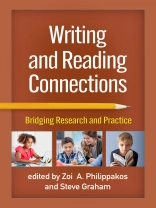Writing skills are essential for success in the 21st-century school and workplace, but most classrooms devote far more time to reading instruction, with writing often addressed in isolation or excluded. In this insightful professional development resource and text, leading researchers discuss why and how to integrate writing and reading instruction in grades K–12 and beyond. Contributors explore how to harness writing–reading connections to support learning in such areas as phonics and spelling, vocabulary, understanding genre and text structure, and self-regulated strategy development, as well as across content areas and disciplines. Special considerations in teaching emergent bilingual students and struggling literacy learners are described. User-friendly features include guiding questions, classroom examples, and action questions that help teachers translate the research and concepts into practice.
An NCTQ Exemplary Text for Reading Instruction
Inhaltsverzeichnis
I. Introduction to Writing and Reading Connections
1. The History of Writing and Reading Connections, Timothy Shanahan
II. Specific Applications of Writing and Reading Connections
2. A Tale of Two Closely Related Skills: Word Reading and Spelling Development and Instruction, Young-Suk Kim
3. The Role of Vocabulary in and for Writing, Margaret G. Mc Keown
4. From Talk to Text: Implementing Student Discussions That Matter, Deanna Kuhn, Mariel Halpern, & Sybille Bruun
5. Writing to Promote Better Reading Comprehension, Steve Graham & Adiba Nusrat
6. Genre and Text Structure in Writing and Reading Instruction, Zoi A. Philippakos
7. Assessment in Writing and Reading, Paul Deane
8. Self-Regulated Strategy Development: Reading Source Materials to Learn and Write, Karen R. Harris & Linda H. Mason
9. Writing and Reading Connections in the Digital World, Allison N. Sonia, Laura K. Allen, & Scott A. Crossley
III. Writing and Reading Connections in the Content Areas
10. Integrating Writing and Reading Instruction in the English Language Arts Classroom, Carol Booth Olson, Jenell Krishnan, & Huy Q. Chung
11. Writing, Reading, and Social Studies, Nell K. Duke, Anne-Lise Halvorsen, & Abby Reisman
12. Liberation through Literacy in Science, Catherine Lammert & Brian Hand
13. Thinking Beyond Symbols: Writing and Reading in Mathematics, Sarah R. Powell & Michael A. Hebert
IV. Writing and Reading Connections with Specific Groups of Learners
14. Writing and Reading with Emergent Bilingual Learners, Alison G. Boardman & Sandra A. Butvilofsky
15. Addressing the Needs of Students Who Struggle with Literacy, Michael A. Hebert, Pamela Bazis, & Tanya Santangelo
16. Integrated Writing and Reading Instruction in College, Charles A. Mac Arthur
Index
Über den Autor
Zoi A. Philippakos, Ph D, is Associate Professor in the Department of Theory and Practice in Teacher Education at The University of Tennessee, Knoxville. Her research interests include reading and writing instruction in K–12 and postsecondary classrooms, strategy instruction with self-regulation, and teacher professional development. Dr. Philippakos is a recipient of the Faculty Research Excellence Award from the College of Education, Health, and Human Sciences and the Provost Award for Professional Promise in Research and Creative Achievement from The University of Tennessee, as well as the Early Career Achievement Award from the Literacy Research Association. She chaired the Writing Task Force for the International Literacy Association and coauthored a Research Advisory titled Teaching Writing to Improve Reading Skills. Dr. Philippakos is coauthor or coeditor of several books and presents her work at national and international conferences.
Steve Graham, Ed D, is a Regents Professor and the Warner Professor in the Division of Leadership and Innovation at Mary Lou Fulton Teachers College, Arizona State University. For more than 40 years, he has studied how writing develops, how to teach it effectively, and how it can be used to support reading and learning. Dr. Graham’s research involves typically developing writers and students with special needs in both elementary and secondary schools, with much of this research occurring in classrooms in urban schools. Dr. Graham is a recipient of the Thorndike Career Award from Division 15 of the American Psychological Association, the William S. Gray Citation of Merit from the International Literacy Association, and the Exemplary Research in Teaching and Teacher Education Award from Division K of the American Educational Research Association, among other awards. He is the former editor of several journals, including the Journal of Writing Research, and is coauthor or coeditor of several books and three influential Carnegie Corporation reports on writing.












